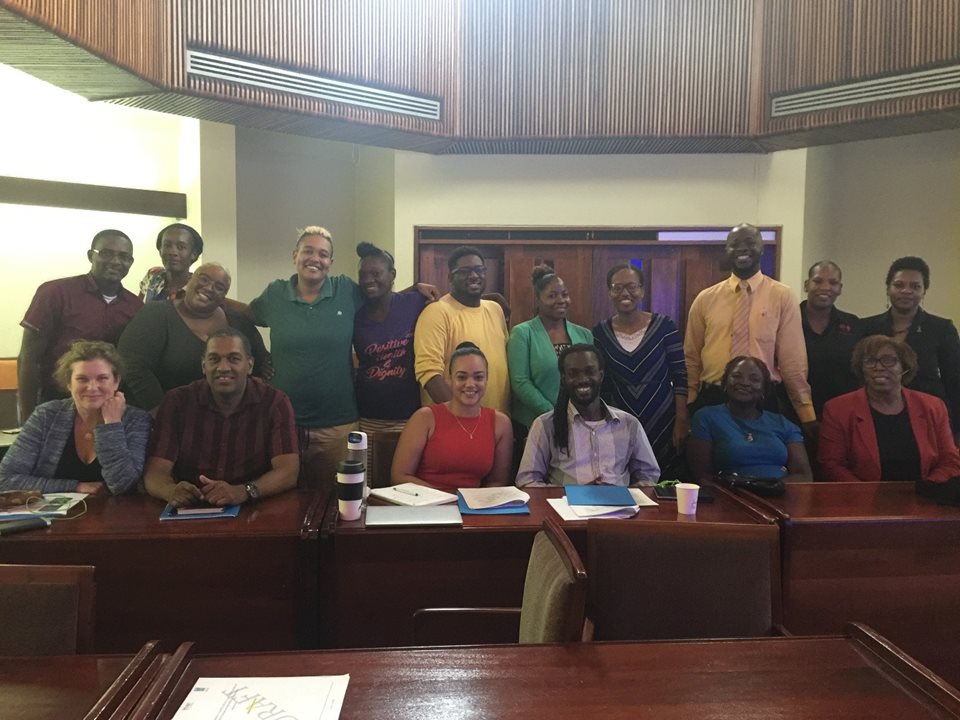By Ayokunle Ogundipe
Representatives from Jamaican civil society converged in the heart of downtown Kingston on October 9, 2019 for a full day workshop to discuss the barriers that persons living with disabilities have in getting access to justice.
Two draft position papers prepared by a Justice Policy Advocacy Group of Jamaican Civil Society Organisations highlighted the disproportionate barriers to accessing justice faced by persons living with disabilities in Jamaica when compared to other citizens. The group also responded to long-standing concerns about violations of the rights of Jamaican children in conflict with the law—particularly those subject to correctional orders.
The CBA led the workshop as part of its work in support of the Justice Undertakings for Social Transformation (JUST); Social Order Component, part of a broader $19.8 million justice sector reform initiative in Jamaica known as the “JUST Program. The CBA supports the JUST program by designing and implementing initiatives to improve the capacity of civil society representatives and Jamaican attorneys to participate in the justice reform process.
The draft papers were titled “Barriers to Access to Justice for Persons with Disabilities in Jamaica” and “Jamaican Children in Conflict with the Law: Opportunities for Positive Change through Effective Governance”. The Justice Policy Advocacy Group; comprises the Combined Disabilities Association, Eve for Life, Jamaica AIDS Support for Life, Jamaica Association for the Deaf, Jamaicans for Justice, WMW Jamaica, Woman Inc., Women’s Resource and Outreach Centre and Norman Manley Law School.
During breakout sessions, participants were forthright with their input and generally supportive of the positions taken in the papers. The introduction of an explicit focus on access to justice in the Disabilities Act, 2014, when it is reviewed in three years, was one recommendation. Measures were also proposed to prevent discrimination on the basis of disability, pursuant to sections 24 and 25 of the Disabilities Act 2014. Amendments were proposed to the Child Care Protection Act and Child Justice Guidelines to more explicitly prohibit children from being kept overnight in police lockups that are not specifically designated for children.
At the end of the workshop, eight participants (in addition to Advocacy Group members) expressed interest in receiving the final drafts of the position papers which are due to be published widely in Jamaica within the next few months.
The JUST Program is funded by Global Affairs Canada and implemented by the Government of Jamaica (Ministry of Justice) with support from Canada’s Department of Justice and the United Nations Development Program.
The CBA has played a role in supporting Jamaican civil society and Bar associations dating back to 2006-2007 when the Jamaican Government undertook a major justice system review, establishing a high-profile national task force for this purpose: the Jamaica Justice System Review Task Force (JJSRTF). The JJSRTF’s work was supported by the CBA and Ministry of Justice. The comprehensive review involved a major research program; a national consultation program; and a court administration demonstration project. The initiative also established an Advisory Committee of Canadian judicial and legal specialists to serve as peers and mentors to their Jamaican counterparts. The work of the JJSRTF culminated in a final report which has since influenced recommendations to guide short, medium- and long-term reform efforts in Jamaica.
Ayokunle Ogundipe is Program Manager, International Initiatives at the CBA.

CBA’s Policy Advocacy Specialist, Sarah MacKenzie (front left), worked with representatives of civil society organizations in Jamaica on a workshop to discuss barriers that persons living with disabilities have in accessing justice.